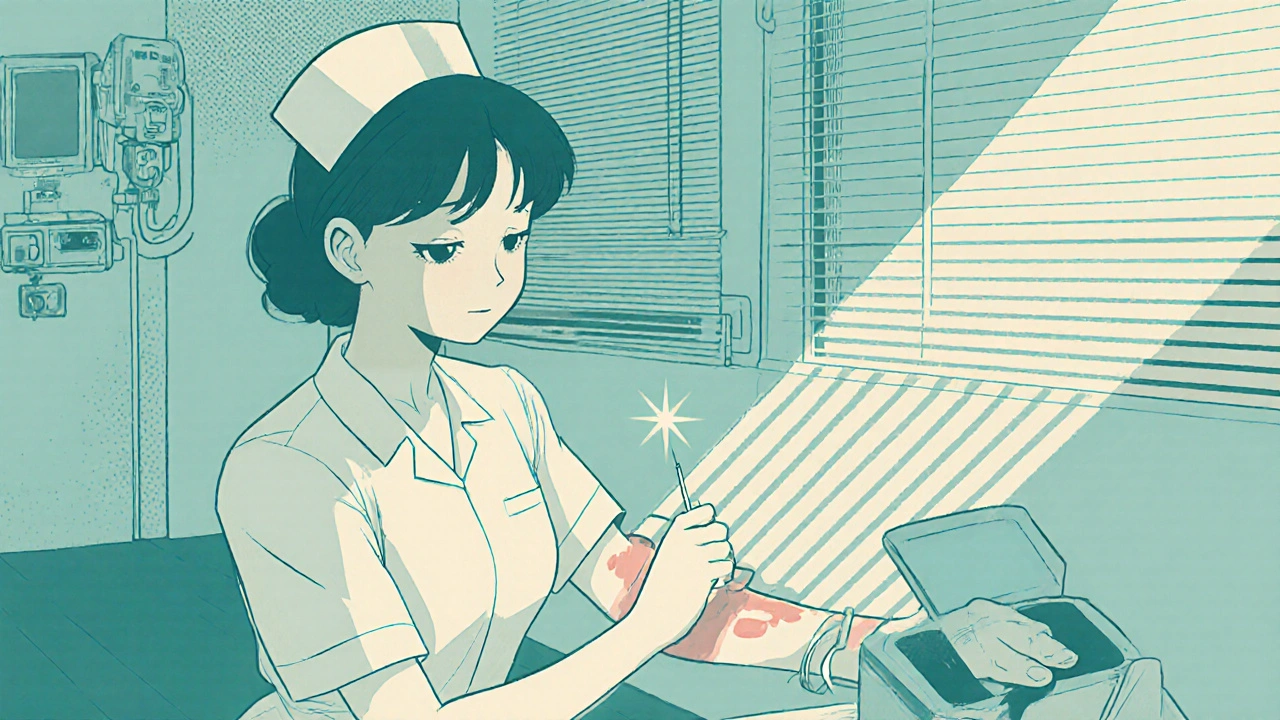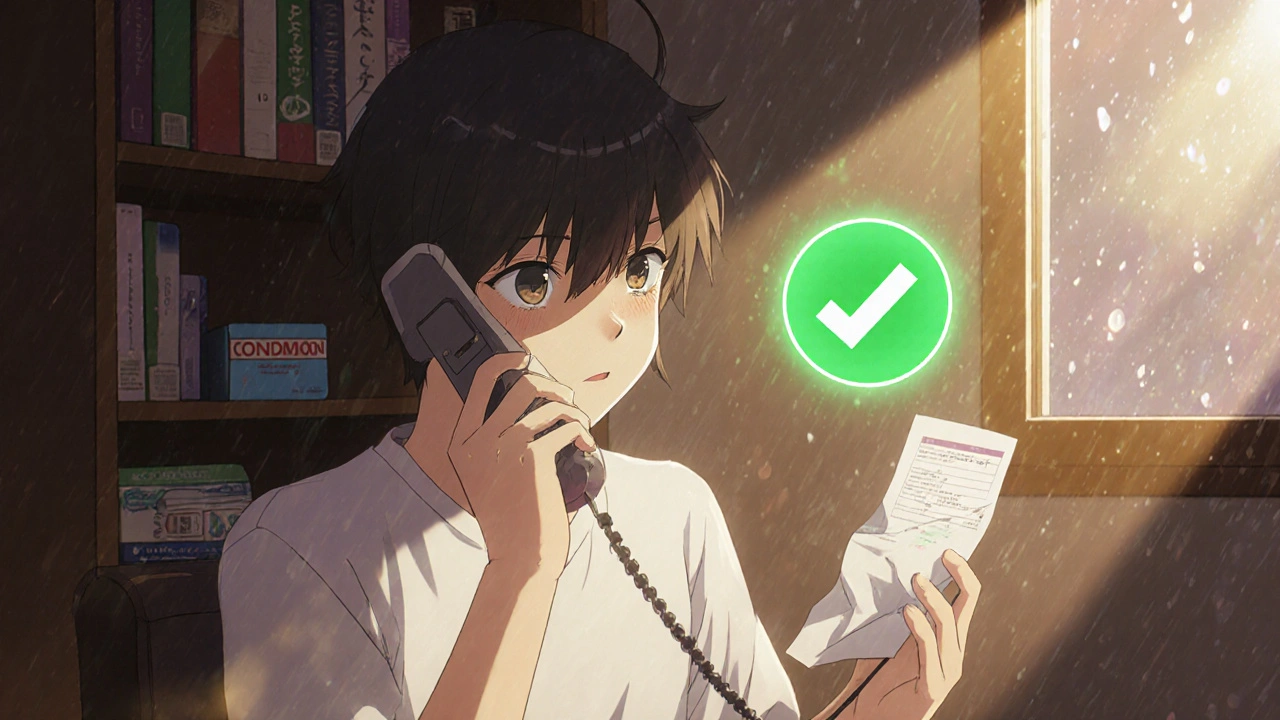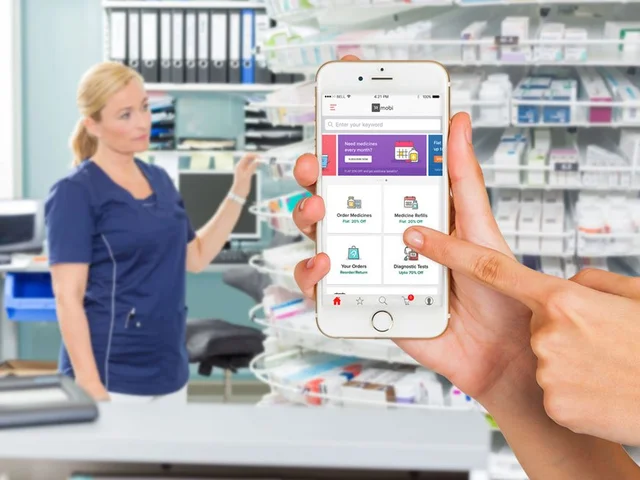If you're nervous about getting tested for syphilis, you're not alone. Many people worry about the process, what the results mean, or how it might affect their life. But here’s the truth: syphilis testing is quick, simple, and one of the most important things you can do for your sexual health. It’s not scary. It’s not embarrassing. It’s just medicine.
Why Get Tested for Syphilis?
Syphilis is a bacterial infection spread mostly through sexual contact. Left untreated, it can cause serious damage to your heart, brain, and nervous system. The scary part? You might not feel sick at all. In fact, many people with syphilis don’t have symptoms for years. That’s why testing isn’t just for when you feel unwell-it’s for anyone who’s sexually active.
The CDC recommends annual syphilis testing for sexually active men who have sex with men, pregnant people, and anyone with a new or multiple partners. If you’ve had unprotected sex, shared needles, or been told a partner has syphilis, testing is urgent. Early detection means easy treatment. Delaying it can lead to lifelong complications.
How Is Syphilis Tested?
There are two main ways to test for syphilis: blood tests and fluid tests. For most people, it’s a simple blood draw. No swabs, no pain, no discomfort beyond a quick pinch.
The lab looks for antibodies your body makes to fight the syphilis bacteria, called Treponema pallidum. These antibodies show up in your blood within a few weeks after infection. If you were exposed recently, your doctor might ask you to wait a few weeks before testing to make sure the results are accurate.
In rare cases-like if you have a sore or rash-your doctor may take a sample from the lesion using a swab. This is called a dark-field microscopy test. It’s not common, but it gives a direct look at the bacteria. Most clinics don’t even do this anymore because blood tests are faster and more reliable.
What Happens During the Test?
Walking into a clinic for a syphilis test feels different for everyone. Some people feel anxious. Others are calm. Either way, here’s exactly what you’ll experience.
- You’ll check in at the front desk and fill out a short form. This includes basic info like your name, age, and sexual history. You don’t need to give details you’re uncomfortable with-just enough for the provider to assess risk.
- A nurse or doctor will explain the test. They’ll ask if you’ve had symptoms like sores, rashes, or unexplained fever. Don’t lie. The more honest you are, the better they can help.
- They’ll clean your arm with alcohol and tie a band around your upper arm to make veins pop out. Then, they’ll insert a small needle. You’ll feel a quick sting, and that’s it.
- The blood is drawn into a vial. It takes less than a minute.
- The band is removed, a cotton ball is pressed to your arm, and you’re done.
That’s it. No waiting. No special prep. You can drive, eat, or go back to work right after. No one will know what you were there for unless you tell them.
How Long Does It Take to Get Results?
Most clinics send your sample to a lab. Results usually come back in 1 to 3 days. Some urgent care centers or sexual health clinics offer rapid tests with results in 20 minutes.
But here’s the catch: a rapid test is just a screen. If it’s positive, you’ll need a second, more accurate blood test to confirm. That’s standard for all STIs. False positives happen, so labs always double-check.
When your results are ready, the clinic will call you. If they don’t call, follow up. Don’t assume you’re fine. Silence doesn’t mean good news.

What Do the Results Mean?
There are three possible outcomes: negative, positive, or inconclusive.
- Negative: No signs of syphilis. That’s great. But if you were exposed within the last 3 weeks, you might need to test again later. Antibodies take time to show up.
- Positive: The test found syphilis antibodies. This doesn’t mean you have an active infection-it just means you’ve been exposed at some point. Your doctor will look at your medical history and may order a second test to see if the infection is current.
- Inconclusive: The results are unclear. This happens sometimes. You’ll be asked to come back for another test in a few weeks.
If you’re diagnosed with syphilis, don’t panic. It’s 100% curable with antibiotics. Most people get one shot of penicillin. If you’re allergic, there are other options. Treatment works best when caught early.
What Happens After a Positive Result?
If your test comes back positive, you’ll be offered treatment right away. You’ll also be asked to list anyone you’ve had sex with in the past year. This is called partner notification.
Don’t worry-you don’t have to call them yourself. The clinic can do it anonymously. They’ll send a note saying someone they’ve been with tested positive, and they should get checked. No names. No blame. Just health.
You’ll also be tested for other STIs like HIV, gonorrhea, and chlamydia. It’s standard practice. Syphilis makes you more likely to catch or spread HIV, so checking everything is part of the process.
After treatment, you’ll need follow-up blood tests at 6 and 12 months to make sure the infection is gone. You can’t get reinfected just because you were treated before. If you have unprotected sex again, you can catch it again.
Can You Test at Home?
Yes, at-home syphilis test kits are available. You prick your finger, drop blood on a card, and mail it to a lab. Results come in 2-5 days.
But here’s the problem: these tests aren’t always accurate. If you get a positive result, you still need to see a doctor for confirmation. If you get a negative result but still have symptoms, you can’t trust it. Labs have better equipment. Clinics have trained staff who can guide you.
At-home tests are fine if you’re testing regularly and have no symptoms. But if you’re worried, or have had a risky exposure, go to a clinic. It’s safer, faster, and you get support right away.

How Often Should You Get Tested?
There’s no one-size-fits-all answer. It depends on your life.
- If you’re a man who has sex with men: get tested every 3 to 6 months if you have multiple partners.
- If you’re pregnant: you’ll be tested at your first prenatal visit. Some places test again in the third trimester or at delivery.
- If you have a new partner: get tested before having unprotected sex.
- If you’ve had unprotected sex or shared needles: get tested immediately and again in 3 months.
- If you’re in a long-term monogamous relationship and both tested negative: yearly is fine.
Testing every year is a smart habit for anyone sexually active. It’s like getting your blood pressure checked. You don’t wait until you feel dizzy-you check regularly to stay safe.
What If You’re Scared?
It’s okay to be scared. You’re not weak for feeling that way. But remember: syphilis doesn’t care if you’re embarrassed. It only cares if you don’t get tested.
Think of it this way: you wouldn’t skip a car check-up because you’re afraid of what the mechanic might find. Your body deserves the same care.
Most clinics offer confidential, non-judgmental testing. Staff have seen it all. They’re there to help, not to judge. You’re not the first person to walk in nervous. You won’t be the last.
If you need support, call a sexual health hotline. In Australia, you can reach 1800 451 624 (National Sexual Health Line). They’ll answer your questions, help you find a clinic, or even walk you through what to expect.
Final Thoughts
Syphilis testing isn’t a punishment. It’s protection. It’s not a sign of failure-it’s a sign of responsibility. You’re taking control of your health. That’s something to be proud of.
One test. One needle. One minute of discomfort. And you could be saving yourself from years of pain, damage, or even passing something on to someone you love.
Don’t wait for symptoms. Don’t wait for someone else to say you should. If you’re sexually active, get tested. It’s that simple.
Can you get syphilis from kissing?
Yes, but only if there’s an open sore in the mouth or on the lips. Syphilis spreads through direct contact with a chancre (the first sore), which can appear on the lips, tongue, or inside the mouth. Casual kissing without sores won’t spread it. Most cases come from vaginal, anal, or oral sex.
Does syphilis show up on a regular STI panel?
Not always. Many clinics offer a basic STI panel that tests for chlamydia and gonorrhea, but syphilis often requires a separate blood test. Always ask if syphilis is included. Don’t assume. If you’re unsure, say, “Can you test me for syphilis too?” It’s a normal request.
Can you test negative for syphilis and still have it?
Yes, if you were infected very recently. The body takes 2-6 weeks to produce detectable antibodies. If you had unprotected sex last week and test today, you might get a false negative. Wait at least 3 weeks, and if you still have symptoms, retest after 6 weeks.
Is syphilis testing free?
In Australia, syphilis testing is free at public sexual health clinics and some community health centers. You don’t need a Medicare card. Private clinics may charge, but it’s usually under $50. Many universities and NGOs offer free testing too. If cost is a barrier, call ahead-there are options.
Can syphilis come back after treatment?
The infection itself doesn’t come back if treated properly. But you can get reinfected if you have unprotected sex with someone who has syphilis. Being treated doesn’t make you immune. Always use condoms and get tested regularly, especially after new partners.
Do you need to tell your partner if you have syphilis?
Yes, ethically and legally. It’s your responsibility to let recent partners know so they can get tested and treated. Your clinic can help you do this anonymously. They’ll contact partners without revealing your name. It’s not about blame-it’s about stopping the spread.
If you’ve ever avoided testing because you were scared, ashamed, or thought it wouldn’t happen to you-this is your sign to change that. Syphilis doesn’t care about your background, your relationship status, or how careful you think you are. It only cares if you don’t get tested. Don’t wait. Get checked. Your future self will thank you.





Marjorie Antoniou - 19 November 2025
I got tested last year after a hookup went sideways. Honestly? The whole thing took like 5 minutes. The nurse was so chill, she even cracked a joke about how we all pretend we’re not terrified of needles. I cried a little. Not from pain-from relief. That’s the thing nobody tells you: getting tested isn’t just about health. It’s about reclaiming your peace.
Andrew Baggley - 21 November 2025
Look, I used to think STI testing was for ‘other people.’ Then I got lazy and skipped a year. Ended up with chlamydia. No symptoms. Just a weird discharge and a panic attack at 2 a.m. Don’t be me. Get tested. It’s not a moral test-it’s a medical one. You’re not dirty for wanting to stay healthy. You’re smart.
Frank Dahlmeyer - 21 November 2025
Let me tell you something that changed my life: syphilis doesn’t discriminate. It doesn’t care if you’re rich, poor, religious, queer, married, or single. It just wants to spread. And here’s the kicker-it’s been around since the 1500s. Columbus’s crew probably passed it around like a joint at a festival. But here’s the beautiful part: we’ve had a cure since 1943. Penicillin. One shot. Done. So why are we still whispering about it? Because shame is louder than science. We need to stop treating STDs like sins and start treating them like colds. You don’t feel guilty for having a runny nose, do you? Then why do you feel guilty for getting tested? You’re not broken. You’re just human. And humans get sick. And humans heal. And healing starts with a needle. One prick. One moment of courage. That’s all it takes to protect yourself, your partners, and your future. So go. Do it. Now. Your body will thank you in ten years when you’re still alive and healthy and not wondering what could’ve been.
Codie Wagers - 22 November 2025
Let’s be precise: the notion that syphilis testing is ‘simple’ is a dangerous oversimplification. The biological reality is that serological tests detect antibodies, not the pathogen itself. This introduces a temporal lag-window periods vary between 10–90 days depending on immune response. Furthermore, false positives occur in 0.1–0.5% of cases due to cross-reactivity with lupus, Lyme, or even pregnancy. The article’s assertion that ‘one needle’ is sufficient ignores the cascade of confirmatory testing required in clinical practice. To frame this as ‘no big deal’ is not just misleading-it’s ethically irresponsible. You are not ‘just medicine.’ You are a complex biological system navigating a flawed public health infrastructure. Stop romanticizing the needle. Start demanding better diagnostics.
Paige Lund - 22 November 2025
Wow. A whole essay on a blood test. Did they pay you to write this or did you just get really bored one Tuesday?
Reema Al-Zaheri - 23 November 2025
It is imperative to note, however, that the CDC guidelines referenced are not universally applicable; regional prevalence, co-infection rates, and access to care vary dramatically across socioeconomic strata. Moreover, the assertion that ‘at-home tests are fine if you’re testing regularly’ is statistically unsound, given the documented sensitivity rates of 82–94% for finger-prick assays, compared to 99.7% for lab-based ELISA. Furthermore, the omission of HIV co-testing as a mandatory protocol-rather than an ‘optional add-on’-is a critical oversight in public health messaging.
Michael Salmon - 25 November 2025
Of course it’s ‘easy’ to test. Because the system wants you to. They profit off the fear. They profit off the testing. They profit off the treatment. And then they tell you it’s ‘responsible’ to play along. You think you’re being proactive? You’re just another data point in a $30 billion STI industry. Meanwhile, real healthcare-like mental health, dental, or primary care-is a nightmare. But hey, get your syphilis test. That’s what they want. That’s what they’ve trained you to do.
Joe Durham - 26 November 2025
My partner and I got tested together last month. It felt weird at first-like we were doing something secret. But after? We felt closer. Like we’d taken a step toward real trust. I know some people think that’s cheesy. But if you’ve ever been scared to ask someone, ‘Hey, have you been tested?’-you know how huge that moment is. It’s not about fear. It’s about care. And yeah, it’s awkward. But so is cancer screening. And we don’t shame people for that. Why should we shame this?
Derron Vanderpoel - 27 November 2025
I went in thinking I was gonna die. I swear to god I thought the nurse was gonna say ‘you have the black death.’ But she just smiled and said ‘you’re good.’ I cried. Like, ugly sobbing. I didn’t even know I was that scared until it was over. I didn’t tell anyone. Not even my best friend. But I just… felt lighter. Like I’d been carrying a rock in my chest for years. And now it’s gone. Thank you to whoever wrote this. I needed to read this today.
Timothy Reed - 29 November 2025
As a public health educator, I appreciate the clarity of this guide. However, I would recommend expanding the section on partner notification to emphasize the legal obligations in certain jurisdictions. In some states, failure to disclose a positive STI diagnosis to sexual partners can result in civil or criminal liability. Additionally, while at-home tests offer convenience, their utility is limited in asymptomatic populations. Clinical oversight remains essential for accurate interpretation and linkage to care.
Christopher K - 30 November 2025
Why are we letting the government tell us what to do with our bodies? Next they’ll make us test for the common cold. ‘Oh, you kissed someone? Better get your nasal swab!’ This is socialism disguised as healthcare. You want to get tested? Fine. But don’t act like it’s a civic duty. It’s your choice. Not the CDC’s.
harenee hanapi - 1 December 2025
Everyone’s so quick to say ‘just get tested’ like it’s no big deal-but have you ever been the person who tested positive? No? Then don’t pretend you know how it feels. I was diagnosed last year. My whole life fell apart. My boyfriend left. My mom cried for three days. My coworkers whispered. I lost my job because HR found out. And now you’re all sitting here like it’s some cute little wellness hack? It’s not. It’s trauma wrapped in a blood vial. So stop glorifying it.
river weiss - 3 December 2025
For anyone considering at-home testing: while convenient, these kits lack the clinical context that a trained provider provides. A negative result does not rule out recent exposure, and a positive result requires immediate medical follow-up to determine stage and treatment. Furthermore, syphilis testing must be integrated into comprehensive sexual health screening-including HIV, hepatitis B/C, and HSV-because co-infection is common. Always seek care from a licensed provider who can offer counseling, partner services, and follow-up. You are not just a test result. You are a person with rights, needs, and dignity.
Marjorie Antoniou - 5 December 2025
Reema, you’re right about the sensitivity gap. I used an at-home kit first. Got a negative. Then went to the clinic three weeks later. Positive. That’s why I’m so grateful for the free clinic down the street-they didn’t just give me a result. They gave me a plan. And someone to hold my hand while I cried. That’s what matters. Not the test. The care behind it.